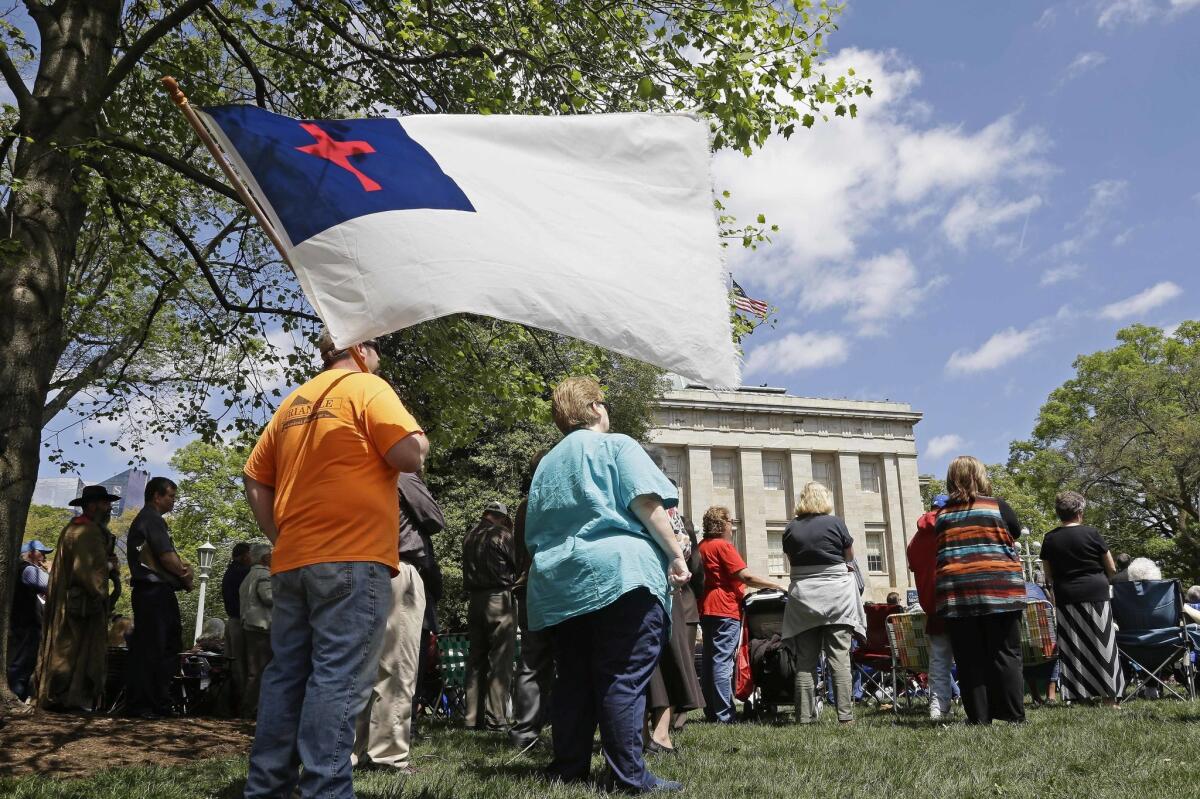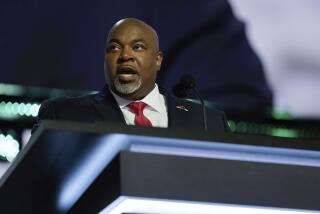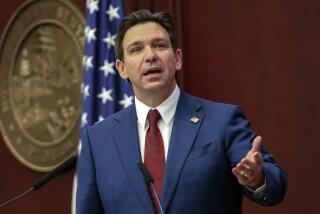North Carolina governor backs down -- a bit -- on state’s controversial LGBT law
- Share via
Conventions have been canceled, rock concerts scrubbed, and corporations have yanked their business from North Carolina to protest a state law that critics say discriminates against gay, lesbian and transgender people.
Even the porn site xHamster.com is confronting users with a question: “Do you support the anti-LGBT bill in North Carolina?” Users who click yes are notified, via pop-up, that their access has been blocked.
These are tough days for the Republican North Carolina lawmakers who passed a law last month limiting legal protections for LGBT people at hotels, shops and restaurants. The law also restricted which bathrooms and locker rooms transgender people can use.
Now, as North Carolina faces the possibility of more business lost to corporate and celebrity protests, Republican Gov. Pat McCrory is trying to douse national criticism — without significantly changing the law.
“I have come to the conclusion that there is a great deal of misinformation, misinterpretation, confusion, a lot of passion and frankly, selective outrage and hypocrisy, especially against the great state of North Carolina,” McCrory said in a video statement Tuesday.
However, in response to public feedback, he announced he had signed an executive order intended to “affirm and improve the state’s commitment to privacy and equality.” Republican lawmakers had passed the law to override a Charlotte city LGBT nondiscrimination ordinance.
On its face, McCrory’s executive order expanded the state’s equal-opportunity employment policy to ban discrimination based on sexual orientation and gender identity — a seeming extension of protections for state government workers.
Additionally, McCrory said he would immediately seek approval of a new law in the upcoming legislative session to “reinstate the right to sue for discrimination in North Carolina state courts.”
Yet critics swiftly responded that the governor had not made any significant changes. The executive order did little to alter the state’s requirement that transgender people use the public bathrooms and locker rooms that match the gender on their birth certificates. Nor did the order restore the ability of cities to determine their own LGBT nondiscrimination policies.
Chase Strangio, an attorney with the American Civil Liberties Union who is suing the state over the new law, said the equal-opportunity employment provision approved by McCrory doesn’t change anything for state government workers because they theoretically are already covered under federal employment provisions.
Join the conversation on Facebook >>
“It doesn’t do anything,” Strangio said of the executive order in an interview. “It does nothing to roll back or mitigate any of the harm [to] the LGBT community from [House Bill 2].”
The ACLU’s North Carolina chapter also criticized the governor’s announcement as ineffectual.
“Gov. McCrory’s actions today are a poor effort to save face after his sweeping attacks on the LGBT community, and they fall far short of correcting the damage done when he signed the harmful House Bill 2 into law which stigmatizes and mandates discrimination against gay and transgender people,” Sarah Preston, acting executive director of the ACLU of North Carolina, said in a statement.
North Carolina’s Democratic Atty. Gen. Roy Cooper, who has publicly opposed the law, was equally blunt, calling the executive order “a day late and a veto short” and urging the governor to work on a repeal.
“The sweeping discrimination law he signed has already cost North Carolina hundreds of jobs and millions of dollars in revenue,” Cooper said.

Supporters of a new state law gather on Monday for a rally outside the North Carolina State Capitol in Raleigh.
Republican Senate Leader Phil Berger praised the governor’s order, criticizing Cooper and the “left-wing political correctness mob ... who will never stop trashing North Carolina until they achieve their goal of allowing any man into any women’s bathroom or locker room at any time simply by claiming to feel like a woman.”
Less than a week after McCrory signed the law on March 23, LGBT advocacy groups filed a federal lawsuit, arguing the state law violates the U.S. Constitution by “singling out LGBT people for disfavored treatment.”
The law, dubbed the Public Facilities Privacy & Security Act, has drawn strong opposition from major corporations including Apple and Google, as well as popular entertainers such as Bruce Springsteen, who canceled a concert in Greensboro, N.C.
Springsteen said the law represents “an attempt by people who cannot stand the progress our country has made in recognizing the human rights of all of our citizens to overturn that progress.”
PayPal has announced it is abandoning its plan to bring 400 jobs to the state and Deutsche Bank is reportedly freezing plans to create 250 new jobs in North Carolina. The Los Angeles County Metropolitan Transportation Authority has forbade staff from traveling to Charlotte for a conference hosted by the American Public Transportation Assn.
A spokesman for Cyprus-based porn site xHamster said the goal of the site’s boycott “is to fight for the equality for everyone” and that “everybody has a right to their own sexuality and xHamster is there to love and support people the way they are.”
Staff writer Pearce reported from Los Angeles and special correspondent Jarvie from Atlanta.
Follow @MattDPearce for national news
ALSO
Get ready for more state-level showdowns over LGBT rights
Bruce Springsteen cancels North Carolina concert over state’s anti-LGBT bill
Metro will boycott North Carolina conference in protest of anti-LGBT ‘bathroom law’
More to Read
Sign up for Essential California
The most important California stories and recommendations in your inbox every morning.
You may occasionally receive promotional content from the Los Angeles Times.











